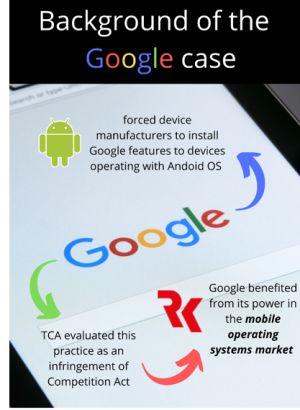In mid-2015, the economic unity formed by Google LLC., Google International LLC. and Google Reklamcılık ve Pazarlama Ltd. Şti. (will be referred to as "Google" hereinafter) was shook by a complaint filed by one of its rivals, Limited Liability Company Yandex ("Yandex") before the Turkish Competition Authority (the "TCA"). In its complaint, Yandex alleged that Google was forcing device manufacturers to make Google Search, Google Search widget and Google Webview the default and exclusive features for devices operating on Android Operating System.

During the course of the investigation, the TCA examined Google's Mobile Application Distribution Agreement ("MDMA") and Revenue Share Agreement ("RSA") signed with device manufacturers. Following the conclusion of the investigation in September 2018, Google faced administrative fines on the ground that the practices foreseen under the MDMA and RSA infringed the Act No. 4054 on the Protection of Competition ("Competition Act"). TCA stated that Google's practice of enforcing its Search and Webview features as default and exclusive features in Android devices rooted from its power in the mobile operating systems market and such practices resulted in the exclusion of Google's competitors from offering their search engine services to device manufacturers. In the meantime, due to abuse of its dominance position Google faced an administrative fine of 14,409,198 Euro (TRY 93,083,422.30) along with additional obligations.
Within scope of such additional obligations, Google was requested to remove from all of its agreements signed with device manufacturers the following conditions and any provisions that directly or indirectly result in the same effects as the stipulated conditions within 6 months after the notification of the reasoned decision:
- Obligation to install Google search widget (a prerequisite for licencing) as an exclusive feature on the home screen,
- Obligation to make Google Search (a prerequisite for licencing) a default feature in all search access points of the current design structure. In this framework, Google was also requested not to create an obligation with a similar effect in case a new design structure is implemented,
- Obligation to install Google Webview component (a prerequisite for licencing) as the default and exclusive in-app internet browser,
- Obligation not to pre-install products that compete with Google Search to the devices and the obligation not to use any competitor products in the search points of devices produced by device manufacturers.
Page Error 404: Relevant amendments not found!
Upon receipt of the reasoned decision on February 2019, Google first submitted a draft document to the TCA in May, which communicated the planned amendments to the agreements, however Google also stated that the document was not finalized. In late-July, a compliance package was introduced to the TCA and additional information in relation to the compliance package was submitted in August. In its petition to the TCA, Google claimed to implement measures in its MADA and RSA that removed the exclusivity of Google products in Android devices, however the TCA thought otherwise.
In its detailed analysis, the TCA pointed out the following:
- Claimed amendments were only applicable to device manufacturers that have only signed MADA or both MADA and RSA. In practice, Google signs many agreements under different names and such agreements were excluded from these amendments, allowing Google to continue its infringing activities in many other agreements.
- Considering the wide-ranged and differentiated agreements concluded with device manufacturers, Google failed to explicitly demonstrate how the non-exclusivity will work in practice,
- "Reminding" the device manufacturers that no provision is in effect in the compliance package, forcing device manufacturers to implement only Google search features in search points actually leaves it unclear whether the relevant provisions are removed by way of amendment or not,
- Even though Google removed its contractual tying practice in relation to the instalment of Google Search widget, it put in effect a financial incentive for device manufacturers to use Google Search widget by implementing an additional financial burden if they would like to remove Google Search widget from their devices.
- As for the Google Webview component, Google claimed to leave the decision of using Webview component to device manufacturers. However, Google also included an Annex-1 to its compliance package where additional security and update obligations are forced on device manufacturers who would prefer using rival products to Google Webview component.

Did you mean: additional administrative fines?
Considering its findings above, the TCA was far away from being convinced that Google abided by the obligations set forth in the TCA decision dated September 2018. Reminding the tech giant its obligations once again and emphasizing that the obligations are valid for all agreements signed by Google and removal of relevant provisions are not enough without additional measures to prohibit evasions; the TCA imposed an additional administrative fine. In this regard, Google is now requested to pay five in ten thousand of its 2018 turnover for each day of non-compliance from November 7, 2019 until the stipulated obligations are fully met by the undertaking. It is worth noting that the case-handlers actually requested to ask for the administrative fines from August 7, 2019, the last day for the fulfilment of Google's additional obligations, however the TCA took into consideration its own decision date.
It remains a mystery whether Google will abide by this new fine or further receive a sentence for non-compliance. The undertaking has the right to appeal the decision of the TCA before Ankara Administrative Courts within 60 days of notification of the decision. However, it is now obvious that the TCA takes Google's infringements very seriously and it will continue to scrutinize Google until the wild tech giant is tamed.
The content of this article is intended to provide a general guide to the subject matter. Specialist advice should be sought about your specific circumstances.

